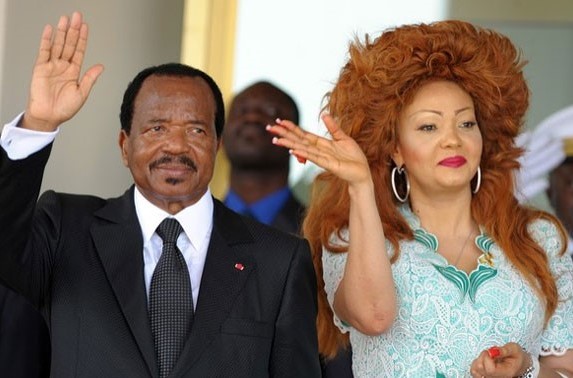AFP photo
By
Joseph Besong
The First Lady of Cameroon H.E Madam Chantal Biya has been presented with an open letter. Biya’s deaf ear to calls from the religious, traditional, and politicians has caused others to try another option, that of passing through the first lady. Below is the open letter.
Dear Madam President,
Your excellence, most of the President’s collaborators’ Best Alternative to a Negotiated Agreement (BATNA) to the Anglophone crisis has failed. This failure is due to a lack of situational awareness, lack of crisis management skills, undue complexity and above all a lack of emotional intelligence. To err is human, we forgive them. Madam, you have the ear of the President H.E Paul Biya. With your permission, I would like to propose key steps you can kindly relay to the President to resolve this crisis.
Phase 1:
-
The path to resolving this crisis begins with these words. “I am sorry”. “I am sorry for the pain the Anglophones, and the youths of the nation have been subjected to. These words can go a long way. Showing empathy is part of leadership. He is the father of our great nation. He should rally Anglophones and ask for their help in resolving this crisis. This is imperative.
-
Unconditionally release all Anglophone consortium leaders, Paul Ayah, and youths currently detained all over the country. Restore internet connectivity to North and South West Regions. Internet shutdown has been pernicious. The state has lost billions and might affect our growth by 1% this year.
-
Replace the governors of North and South West Regions with Anglophones of their respective regions. This part of cultural intelligence, yet self-rule is what Anglophones are clamoring for. They speak the same language and share the same culture.
-
Nominate an Anglophone to lead SONARA.
Madam, the above four steps can be implemented immediately and will cost nothing to our taxpayers. It will show good faith on the part of the government in resolving this crisis. It is practical and effective. It takes only will and grit.
Phase 2:
-
Any successfully negotiated agreement begins with having the right parties on the negotiation table. It was self-evident the last negotiations were in peril due to influential players not present at the negotiation table. Even Anglophone leaders failed to identify this. Thus, the President’s representative Arch Bishop Kleda, Prime Minster, Secretary General at the Presidency, Minister of, Basic, Secondary, and Higher Education, Minister Delegate at Ministry of Justice, US Embassy representative/UN should sit with all Anglophone leaders and address all concerns tabled. The President’s representative should create a unified command system with him acting as the negotiation commander. Adopted resolutions should be tabled directly to the president for implementation free of any cognitive, organizational or political bias.
-
30/70 rule. 30% of all resources generated from a given region should be allocated to regional councils and 70% to government coffers. This rule will save 10% of waste when resources are transferred from Yaoundé to the regions. The government can make up for the remaining 20% by implementing a 5% Internet Sub Tax (IST), 5% Remittance Sub Tax (RST), and increasing the tax pool by 10%. Also, a 2% regional direct and indirect tax (RT) should be implemented to increase revenues for local councils, and abolish the post of Government Delegates. Let the people be in charge of their destiny with the government acting as a regulator.
-
Higher Education. Higher education in the English subsystem is overcrowded and causing cultural tension. University of Buea and Bamenda can’t sustain all our 10 regions. By 2035, 60% or more of our youth population will want an Anglo-Saxon higher education to be able to compete in the 21st– Century. Most elites in the French speaking part of our country have their kids studying in Buea, UK, USA, and Canada.
-
Engaging the diaspora. Giving the diaspora voting rights and awards does not suffice. The diaspora contributes about 30% of our GDP. Engaging this intellectual pool, this human capital will increase our growth between 1-1.5% yearly. We need foreign currency to service our debt. Issue bonds so they can buy; help them create SMEs in Cameroon from their residing countries and much more. They are one of the biggest assets. Shutting the door has made them an effective opposition party.
-
Youth unemployment. Youth unemployment is as high as 70% in some of these regions. Start construction work on the Ring road, Bamenda-Babadjou road ($192 million funding already approved by the World Bank, project ID: P150999), and Menchum Falls in the North West Region. In South West Region, begin tarring on Kumba-Mundemba stretch and intensify work on Kumba-Mamfe-Ekok road. This will not only reduce unemployment but link our country to Nigeria our biggest trading partner.
Madam, some may say these points fall short of their demands, while others might say it’s overreaching. The ZOPA (Zone of Possible Agreement) between both parties are meager. We need your voice to be the voice of the voiceless. Madam, be the voice of the voiceless. Let’s save our beloved Cameroon and strengthen our republican institutions. Your children are crying.



No Comments Yet!
You can be first to comment this post!